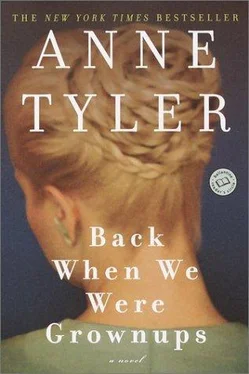And she thought what a clean, simple life she would have led if it weren’t for love.
* * *
Phone photographer, she reminded herself before she went to sleep. Phone NoNo to ask what music she wants. Pick up Poppy’s suit from the cleaner.
She knew she should switch on the lamp and make a list, but she was too tired. Instead, she tried to envision the list on the ceiling above her bed — a mnemonic device that never really worked. Ask Dixon if he could drive Alice Farmer home after the wedding, she added. She slid her left foot to a cooler spot on the sheet. Find out whether Barry…
Then she lost track of her thoughts and lay staring into the dark.
It made her might-have-been existence more real to imagine also the negatives. Will, for instance, would probably have been a workaholic. He was just the type to stay late at the lab and converse in monosyllables when his mind was on his research. There she’d be, serving him a gourmet dinner, wearing something enticing, brushing the back of his neck with her fingers as she poured his wine, and he would say, “You know? I think I’ve figured out where I went wrong in that last experiment.”
As for Tristram: he would never quite outgrow his social ineptness. She and Will would always worry about him a little. Although professionally he would be very successful, doing something scientific that she couldn’t pretend to understand, she didn’t suppose he would marry till relatively late. He tended to develop inappropriate crushes on shallow, bubbly blondes who didn’t return his interest. (You had to be able to see beyond his earnest, shy, fumbling manner.) Like his father, he would seem a bit removed from his own culture.
Oh, it wasn’t always easy, Rebecca would tell her friends.
* * *
“I can’t believe you’re going to let Poppy give a toast at the wedding,” Tina said. “He’s not in earshot, is he.”
“No, he’s up in his room,” Rebecca told her. “He had breakfast hours ago.”
She was hoping to make a point — it was after 9 a.m. — but Tina let it pass right over her head. “The man’s a total loss!” she said. “He seems to have about one-sixteenth of his mind left, every cell of it devoted to the savoring of sweets.”
Rebecca had never heard anyone use the word savoring in casual conversation. She wondered if Tina would spell it in the British way, with an our . She spent so long considering this — standing at the kitchen stove, watching a pat of butter melt and begin to sizzle — that Tina gave a cluck of impatience and reached past her for the egg carton. “My God, it’s some kind of cruel joke,” she said when she had lifted the lid. She was looking down at a double row of eggshells. Rebecca always put the shells back in the carton when she was cooking. In fact, she’d assumed that everyone did. This was what happened when people came to stay: they forced you to view your life from outside, to realize that there was, come to think of it, something faintly mocking about a carton full of empty shells. But two eggs remained intact, and she plucked those out and rapped them against the rim of the skillet.
“As for that birthday party,” Tina said, “I don’t know how you can even consider it! He’d forget you’d thrown it, anyway, half a minute later. And think of the conversation: round and round, the same subjects over and over. All his guests would go mad.”
Rebecca, too, suspected that Poppy might not remember the party afterward. Her hard work would come to nothing. But she said, “That’s okay; we’ll remind him.”
“Simpler just not to do it and tell him you had.”
“Also,” Rebecca said, dreamily stirring the eggs, “it can be kind of interesting when he repeats himself. New details come out, different slants on the old stories. Sometimes I end up learning something.”
“For what that’s worth,” Tina said. “He always was a bit of a bore, even when Aunt Joyce was alive; but now, good God! I guess she covered up for him more than we imagined.”
“Well, who knows? Maybe we’d say the same thing in reverse if he’d been the one who died,” Rebecca said. “Maybe the two of them together made a unit that worked, and whichever one of them went first would have left the other, oh, just… lopsided and lame.”
There was a short silence, during which Rebecca turned off the burner and carried the skillet over to the table. She dished the eggs onto Tina’s plate, set the skillet in the sink, and asked, “Coffee? Tea?”
Only then, turning from the sink, did she notice how intently Tina was studying her. “What,” she said.
Tina said, “Oh, nothing.” She settled at the table, scooping her long skirt beneath her. (Like someone in an old movie, she wore a full-length satin dressing gown to breakfast.) “Coffee, please,” she said. Then she said, “You must have felt sort of lopsided yourself, all these years.”
“Well,” Rebecca said.
“You don’t have any, shall we say, man friend, I suppose.”
“Oh, no,” Rebecca said. She poured a cup of coffee and set it in front of Tina.
“Quite right: why would you want one,” Tina told her. “Such a nuisance, they are.”
This struck Rebecca as unexpectedly kind. She sat down opposite Tina and said, “It isn’t that, exactly—”
“And after baby-sitting Joe Davitch!” Tina said. “No wonder you need a rest. God, the Davitches in general: a bunch of mopers. They could really weigh a person down.”
“Oh, well, I wouldn’t—”
“Any time I think of his mother, I picture her on the verge of tears. You know how her chin would pock up. How her lower lip would quiver. It’s ironic that her profession was throwing parties. I mean, just because your house has fourteen-foot ceilings doesn’t automatically make you a social butterfly, does it. I’ll never forget what I heard her tell an old friend once. ‘I like you, Ginny,’ she said, ‘but do we actually have to get together ?’”
Rebecca smiled, hearing her mother-in-law’s plaintive little voice echoing across the years.
“And Joe’s father taking those pills,” Tina said. “Not even leaving a note behind. There must have been some sort of depressive chromosome or something, descending from both branches.”
“Well, but sometimes they were happy,” Rebecca said, because she was thinking, just then, of her twentieth-birthday party, all those people singing to her around the table.
“And then Aunt Alma, his father’s sister,” Tina said, “forever checking into Sheppard Pratt for little rest cures. Or how about Cousin Ed! Walking in front of that bus.”
Rebecca hated it when Tina showed off her inside knowledge of the Davitches. She herself had never heard of Cousin Ed, and she had thought Aunt Alma’s rest cures were a secret that Mother Davitch had confided to her alone. She said, “Yes, but in any family—”
“And the way Joe drove: those crazy left turns. Tell me those weren’t suicidal! Directly into the path of oncoming traffic. More than once I ducked under the dashboard; I bet you had that experience. Or did he do that only with me.”
No, he had done it with Rebecca.
When they were courting, it hadn’t alarmed her. She had been so trusting, back then. She remembered riding blissfully next to him, cradling his right hand in her lap as he made a dashing one-handed swerve across two lanes of speeding cars. But later she grew more anxious — especially after Min Foo was born. They had even had a couple of quarrels about it. “Who’s behind the wheel, here: you or me?” he had said, and she had said, “Yes, but my life’s at stake too, after all; mine and the children’s. I have a right to object!”
Читать дальше












